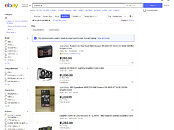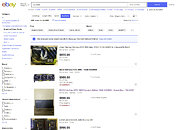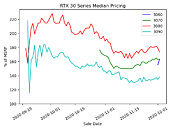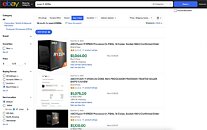
Scalpers Already Prepare NVIDIA GeForce RTX 5090 Listings, up to $7000 for "Guaranteed Slots"
A day after the NVIDIA GeForce RTX 5090 launch, scalpers are already in action to profit from the hype train. Many of these sellers on eBay claim to have "guaranteed" early access through connections with retailers, while others ask for astronomical prices that dwarf the rumored official MSRP. Currently, the graphics card is not widely available, yet eBay and similar sites list it at up to $7,000. Some individuals go so far as to promise customers "guaranteed slots" to secure the product, often with no refund or return policy. These tactics exploit consumer fear of missing out, especially after repeated GPU shortages and scalper-driven price hikes in recent years. NVIDIA has reportedly taken steps to manage supply, planning to "nitpick" distribution and limit bulk business-to-business sales, at least in some regions.
While these efforts may reduce scalping, other jurisdictions lack similar protections. Rumors from German outlets point to NVIDIA aiming to curb large-volume B2B purchases, but no equivalent strategy has been confirmed for markets like the United States or Asia. Interestingly, there are reports from Vietnam of select shops selling RTX 5080 cards before the launch date, heightening fears of a black market for the entire RTX 50 lineup. Additionally, some sellers have disclaimers that shift blame for any potential defects to manufacturers, leaving buyers with minimal recourse. E-commerce platforms typically permit dispute resolutions for damaged goods, rendering these disclaimers largely ineffective. Buying from scalpers encourages price hikes, and there are no guarantees of the product arriving/working, and there is no warranty for after-purchase care.
While these efforts may reduce scalping, other jurisdictions lack similar protections. Rumors from German outlets point to NVIDIA aiming to curb large-volume B2B purchases, but no equivalent strategy has been confirmed for markets like the United States or Asia. Interestingly, there are reports from Vietnam of select shops selling RTX 5080 cards before the launch date, heightening fears of a black market for the entire RTX 50 lineup. Additionally, some sellers have disclaimers that shift blame for any potential defects to manufacturers, leaving buyers with minimal recourse. E-commerce platforms typically permit dispute resolutions for damaged goods, rendering these disclaimers largely ineffective. Buying from scalpers encourages price hikes, and there are no guarantees of the product arriving/working, and there is no warranty for after-purchase care.



















